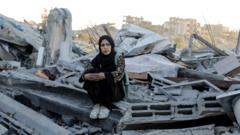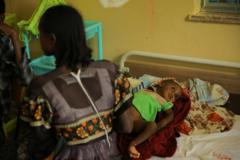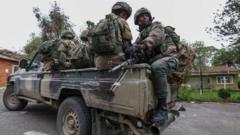The rebuilding of Gaza after recent conflicts is expected to be a lengthy process, according to a UN official, despite an increase in humanitarian aid deliveries. Many individuals and communities require support, and the health care system needs urgent attention. The humanitarian needs are described as staggering, with significant destruction reported across the territory.
Long Road Ahead: UN Official Discusses Gaza's Rebuilding Challenges

Long Road Ahead: UN Official Discusses Gaza's Rebuilding Challenges
Rebuilding efforts in Gaza will face significant hurdles, according to a UN official, as humanitarian aid begins to flow in.
The rebuilding process in the devastated Palestinian territory of Gaza will "take an awful lot of time," a UN official has warned, stressing that rehabilitation extends beyond mere infrastructure. Sam Rose, the acting director of the UN agency for Palestinian refugees (Unrwa) in Gaza, highlighted the enormity of the task following a ceasefire and hostage release deal between Israel and Hamas that has allowed the entry of humanitarian aid.
Since the deal took effect, over 1,545 aid lorries have entered Gaza, delivering essential supplies such as food, tents, and medical materials that had been stuck outside for months. The ceasefire agreement mandates a daily influx of 600 aid lorries during its initial six-week period, which corresponds with the release of hostages in exchange for Palestinian prisoners.
Rose noted that conditions in Gaza have improved significantly with the cessation of active conflict, easing the coordination needed for aid distribution with Israeli authorities. However, he cautioned against equating the quantity of aid with the solutions to the profound human needs in Gaza. "Every person in Gaza has been traumatized...it's going to be a long, long process of rehabilitation and rebuilding," he said, referring to the widespread destruction of homes, roads, and community structures.
The World Health Organization is also taking action, with a 60-day plan to restore Gaza's healthcare system, which has been severely impaired; about half of the hospitals are non-functional. The comprehensive plan aims to address malnutrition, establish temporary clinics, and manage disease outbreaks in the wake of conflict.
UN humanitarian chief Tom Fletcher described humanitarian needs in Gaza as "staggering," citing the ongoing crisis exacerbated by military restrictions on aid and the outcomes of conflict. Meanwhile, Israel denies any limitations on aid deliveries and points fingers at UN agencies for their distribution failures and Hamas for alleged aid theft.
The humanitarian toll in Gaza has been dire, with more than 47,000 reported fatalities and enormous displacement affecting more than 2.3 million residents. As many as 60% of buildings are damaged or destroyed, leaving acute shortages in essential services, food, and shelter.
A Palestinian woman, Manal Abu al-Dragham, expressed her shock upon returning to her devastated home, likening the destruction to an earthquake. Despite the overwhelming challenges, hope persists among residents for rebuilding their lives in their homeland.
Adding to complications, Unrwa faces potential restrictions due to impending Israeli legislation designed to limit its operations within the territory. Despite Israel's accusations against the agency' neutrality, Unrwa remains a crucial player in humanitarian efforts and has vowed to continue its work, albeit amidst significant risks for its staff.
With the conflict's impact still reverberating throughout Gaza, UN officials reaffirm the necessity of sustained humanitarian interventions while navigating a complex landscape of political and practical challenges.






















